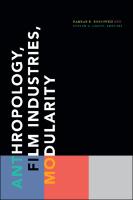Anthropology, Film Industries, Modularity
Contributor(s)
Rossoukh, Ramyar D. (editor)
Caton, Steven C. (editor)
Collection
Knowledge Unlatched (KU)Language
EnglishAbstract
From Bangladesh and Hong Kong to Iran and South Africa, film industries around the world are rapidly growing at a time when new digital technologies are fundamentally changing how films are made and viewed. Larger film industries like Bollywood and Nollywood aim to attain Hollywood's audience and profitability, while smaller, less commercial, and often state-funded enterprises support various cultural and political projects. The contributors to Anthropology, Film Industries, Modularity take an ethnographic and comparative approach to capturing the diversity and growth of global film industries. They outline how modularity—the specialized filmmaking tasks that collectively produce a film—operates as a key feature in every film industry, independent of local context. Whether they are examining the process of dubbing Hollywood films into Hindi, virtual reality filmmaking in South Africa, or on-location shooting in Yemen, the contributors' anthropological methodology brings into relief the universal practices and the local contingencies and deeper cultural realities of film production.
Contributors. Steven C. Caton, Jessica Dickson, Kevin Dwyer, Tejaswini Ganti, Lotte Hoek, Amrita Ibrahim, Sylvia J. Martin, Ramyar D. Rossoukh
Keywords
Performing Arts; Film; History & Criticism; Social Science; Anthropology; Cultural & SocialISBN
9781478092339Publisher
Duke University PressPublisher website
https://www.dukeupress.edu/Publication date and place
2021Grantor
Imprint
Duke University PressClassification
Film history, theory or criticism
Social and cultural anthropology


 Download
Download